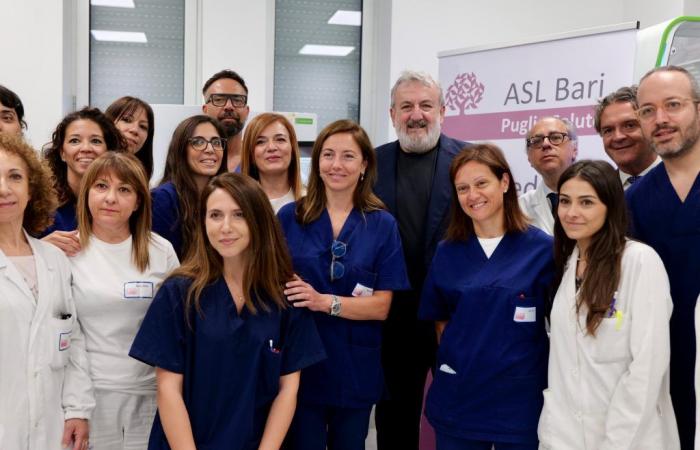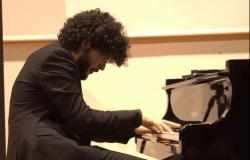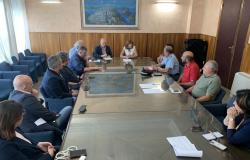
Analyze a group of 388 geneson 3 thousand newborns from Puglialooking for the alterations capable of causing it around 500 rare pathologies. With an ambitious goal: to beat rare diseases to the punch, diagnosing them already in the asymptomatic phase, i.e. before symptoms can develop, and identifying a targeted and personalized therapeutic plan to avoid their effects, improving the prognosis and outcomes of the disease itself.
This is what the Puglia Genome Projectan innovative Neonatal Extended Genetic Screening program established by Regional Law n° 3 of 30 March 2023 to “enhance and extend early diagnosis activities through exome sequencing (the coding portion of the genome) and always keep the Apulian healthcare system aligned with scientific, technological and regulatory progress” in the field of genomics. At the base, a double evidence: 72% of rare diseases (about 7-8 thousand, affecting two million people in Italy) they are of genetic origin And up to 88% have a pediatric onset. Hence the very important role of genetic tests in diagnosis and treatment, making the most of the potential offered by the most advanced New Generation Sequencing-NGS (Next Generation Sequencing) methodologies implemented by ASL Bari.
There operational phase of the experimental project officially started today, with the arrival of the first group of blood samples, taken from newborns present in the Neonatal Intensive Care Units of Puglia, in Medical Genetics Laboratory of the “Di Venere” Hospital in Barithe pole of excellence identified as the reference center for the entire research program.
To welcome the precious “cargo” the Dr. Mattia Gentiledirector of the Medical Genetics Laboratory, the President of the Puglia Region and the acting general director of ASL Bari, Luigi Frusciotogether with the team of 18 professionals including doctors, biologists, nurses and laboratory technicians, demonstrating the relevance of a research project that places Puglia at the forefront in Italy, in the European Union and in the worldbeing the only Italian public pilot study among the 18 currently active in several countries, including the United States, Australia, China, England, France, Germany and South Korea.
The President of the Puglia Region stated that the ASL Bari research project is the result of an investment in machines and personnel to allow the resolution of problems that are often considered unsolvable until after the onset of the disease, while now the diagnosis does not start from the symptoms, but from a genetic screening in the first days of life. According to the President of the Region, it becomes concretely possible that devastating and disabling rare diseases, as well as being very expensive in their management, are treated immediately with an almost normal life expectancy, which makes it desirable to extend this innovative model to the entire national health system, so that all children can have the same opportunities for healing.
«The ASL Bari – underlined the general director Luigi Fruscio – with this genomic profiling project makes a notable technological leap forward, thanks to the many machinery and resources used, which allows us to take care of 3 thousand Apulian children with the simple sampling of a drop of blood and to analyze hundreds of genes through which to diagnose approximately 500 rare diseases early, thus placing Puglia at the center of national and international innovation in the field of genetic analysis. Diagnosing a rare pathology two months in advance means treating it sooner and with better efficacy, as well as ensuring a rationalization of spending for the public system.”
At the same time, the Di Venere project is an integral part of an experiment (financed with PNRR funds) which involves other specialized research centers in Emilia Romagna and Lombardy, with the aim of extending neonatal genetic screening to a national level, focusing on the progress of methodologies of genetic sequencing, on the one hand to expand the genetic panels analyzed, on the other to offer genetic counseling to parents using a telemedicine platform and create the first example of genetic biobank in Italy.
«Today we finally start, there is a bit of emotion – declared Mattia Gentile, director of Medical Genetics at Di Venere – this project is ambitious, it is a challenge: from a drop of blood we will be able to have great results at a genetic level . The first objective is to understand if this new system will work given that we are validating it for the first time, and if the results of the analyzes are reliable. The second objective is to understand how useful it is for our newborns and families, in terms of life expectancy and quality of life. I must thank the general management of the ASL and the medical management for their support and sensitivity to the topic.”
How Genome Puglia works
The Medical Genetics Laboratory is the fulcrum of the project, with the task of studying the genetic profile of 1500 children every year (for two years), through the extraction and analysis of DNA from a small blood sample. The Neonatology and NICU departments of the Di Venere Hospital and the Polyclinic of Bari, the Miulli Ecclesiastical Institution of Acquaviva delle Fonti, and the Perrino hospitals in Brindisi, Vito Fazzi in Lecce and SS Annunziata in Taranto are involved in the activities. The project, which is aimed at developing and validating an extended neonatal genomic screening system, therefore intends to subject newborns to genomic screening using a genetic panel including the genes responsible for those rare diseases currently included in extended neonatal screening (including hereditary metabolic diseases, congenital diseases etc.), with the addition of other known genes related to diseases currently relevant to the availability of new therapies and interventions.
The entire process – completely free for families and respectful of privacy regulations – involves several phases: acceptance of the patient (in anonymized form thanks to a barcode) by the Advanced Genomic Analysis Service of the Medical Genetics Laboratory, for which the biologist Paola Orsini is responsible; Ngs Analysis (automated DNA extraction lines, genetic library preparation and high-throughput new generation sequencing) and Bioinformatic Analysis; identification of the pathogenic variant; close collaboration between the Medical Genetics Laboratory UOC and the Neonatology and Neonatal Intensive Care units for genetic counselling, therapy optimization and clinical-instrumental surveillance; care taken into care in the Reference Centers for Rare Diseases and, for the family with reproductive risk and any prenatal diagnosis, the intervention of the Reproductive Risk Management Department of the Bari ASL (directed by Dr. Paolo Volpe) is envisaged.
Patient enrollment
All newborns are enrolled on voluntary basis only after authorization to the study through specific informed consent from the parents, administered at the relevant NICU. The genetic screening test is an exam absolutely non invasivea withdrawal of a drop of blood from the heel of newborn, in the case of Genoma Puglia facilitated by the fact that the cards already arrive at the Medical Genetics Laboratory of the ASL Bari for the SMA screening required for all newborns in the birth centers of the Region.
Bioinformatic extraction and analysis of NGS data
The analysis procedure involves the collection of neonatal samples from blood spots (Dried Blood Spot DBS) using a punch and the use of a dedicated system for the automated extraction from multiple DBS of DNA of a quality suitable for NGS sequencing. Specialized personnel proceed with the preparation of the genomic libraries of the samples and the sequencing on high-throughput equipment. These technologies allow many cases to be sequenced simultaneously and in a short time. The identified variants are then annotated thanks to the use of specific software. All bioinformatic analysis phases are automated, thus allowing faster management of the results obtained.
The costs of the project
For the acquisition of equipment and materials, for an investment of approximately 1 million eurosthe Administrative Management of the Di Venere Hospital (Dr. Giuseppe Volpe) proceeded with the award through tender of the annual in-service supply, including the sample collection, traceability and collection service, hardware systems and sample acceptance software , dedicated instruments, reagent kits for DNA extraction and NGS analysis.
Management of positive samples
In case of evidence of an abnormality in the newborn screening test further diagnostic tests are carried out to validate the diagnosis of the disease. In fact, if the family has given specific consent, we proceed with the confirmation by trio blood sampling (newborn plus parents) and genetic counseling. Making a correct diagnosis allows for various possibilities: optimizing patient management both in terms of therapy (choice of the most appropriate drug/treatment) and in terms of clinical-instrumental surveillance (implementation of protocols that optimize the cost/benefit ratio); define the prognosis and therefore indicate to the family and caregivers the potential and limits of intervention; define the reproductive risk and therefore the possible recurrence of the condition within the couple/family in order to implement the best and earliest diagnostic strategies.
Taking charge of the patient
On the basis of the identified pathogenic condition, the connection is established with the Centers identified by the Puglia Region and by COREMAR for the care taking over (https://www.sanita.puglia.it/
The fundamental role of the Puglia Region
The Puglia Region has always developed a policy that is very attentive to newborn screening, with the introduction of Extended Neonatal Screening (ENS) already in 2017 and, in recent years, with the approval of some Regional Laws which have allowed the introduction of screening mandatory for Spinal Muscular Atrophy-SMA (Regional Law no. 4 of 2021 – Screening started from 6 December 2021) and, more recently, with Regional Law no. 17 of 2022, mandatory neonatal screening for severe congenital immunodeficiencies, some neuromuscular genetic diseases and lysosomal storage diseases (super extended neonatal screening). The Puglia Region, essentially, is in a position of absolute national record in terms of neonatal screening, with a total of 59 diseases included in the mandatory diagnostic panel.
I like:
I like Loading…





